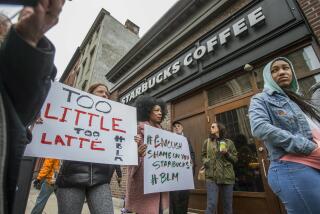Southland Corp. Found Guilty in Racial Bias Case
- Share via
An arbitrator has found Southland Corp., parent of the 7-Eleven retail chain, guilty of intentional racial discrimination against a black couple who owned two of the company’s convenience stores in the Los Angeles area.
The arbitrator, however, ruled in the Dallas-based company’s favor in a separate racial discrimination case.
Jack A. Crickard, the retired Los Angeles County superior court judge who arbitrated the disputes, last week found in the first case that Southland officials illegally pressured the couple to sell their 7-Eleven store in a predominantly white area of Venice. He awarded the couple $500,000 in damages, $200,000 in attorney fees and unspecified legal expenses.
The plaintiffs, Jerry L. Tibbs and Pattie R. Tibbs, who now live in Bakersfield, said they had originally wanted to find a buyer for their other outlet, which is in the largely black community of Rodeo. They said, however, that Southland officials insisted that they sell their Venice outlet first.
Further, the Tibbses said, when they found a black man, Abdul Abubekar, who agreed to buy the Venice store, Southland officials vetoed the deal. Instead, they urged that Abubekar consider other 7-Eleven locations, including the Tibbses’ Rodeo store.
Meanwhile, Southland officials arranged a sale of the Venice store to a white franchisee who already owned three 7-Eleven outlets, even though that buyer didn’t meet the company’s usual financial standards. The arbitrator found that Southland’s district manager, Marc Miller, made a “sweetheart” arrangement with the white franchisee, Herb Domeno, to push through the transaction with “very unconventional speed.”
Crickard also found that Southland “dragged its feet” in approving a buyer for the Tibbses’ Rodeo store. That deal wasn’t completed until June 25, 1987, seven months after Domeno purchased the Venice shop.
In his finding, Crickard rejected Southland officials’ argument that their actions stemmed solely from “pure business judgment and decisions.” He said Southland has an excellent national affirmative action policy, but that, in this case, it failed to prevent discrimination by local Southland employees.
In the second case, however, Crickard rejected arguments by Glenn S. Moore, a black former Southland franchisee, that the company drove him out of business in 1987 for racially motivated reasons. Moore, who owned a 7-Eleven outlet at Adams and Figueroa near the USC campus, said the company had subjected him to unfair accounting, auditing and inventory practices.
Crickard instead found that Moore owes the company $85,933 and ordered that he pay the company that amount, along with attorney fees of $7,000 and unspecified court costs. Audrey Y. Ripley, a lawyer representing Moore, said no decision has been made on whether to appeal.
A spokeswoman for Southland in Dallas, Cecilia Stubbs Norwood, said her company is investigating its options in the Tibbs case. She said Southland officials were “very disappointed” by Crickard’s decision in that case but “very gratified” by his finding that the company has an excellent national affirmative action policy and trade agreement.
“We absolutely do not condone discriminatory practices of any kind in any aspect of our business and we strongly disagree with the arbitrator’s decision in that regard,” she said.
More to Read
Inside the business of entertainment
The Wide Shot brings you news, analysis and insights on everything from streaming wars to production — and what it all means for the future.
You may occasionally receive promotional content from the Los Angeles Times.










